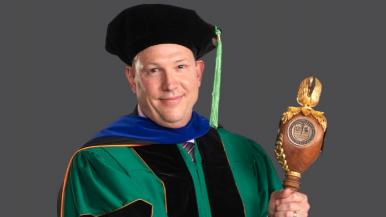The designation of University marshal, the first academic official to enter the commencement hall, is among the highest honors bestowed upon a faculty member at Rush University. The marshal, bearing the University's mace, symbolizes the authority and leadership that faculty exercise over the educational process to ensure the preparation of competent and responsible graduates. In representing the faculty, the marshal is a member held in highest esteem for significant accomplishments in teaching, research, and patient care.
David L. Vines, PhD, MHS, RRT, FAARC, FCCP, will serve as marshal for Rush University’s 49th Commencement Ceremony. Vines is an associate professor and the chairperson of the Department of Cardiopulmonary Sciences and the program director of the respiratory care program at Rush University. We recently sat down with Vines, to find out more about his experience, what he learned from the COVID-19 pandemic and to get his advice for graduates.
Rush University’s ICARE values — innovation, collaboration, accountability, respect and excellence — guide the institution’s mission and vision. Have any one or several of these guiding values contributed to your perseverance working throughout the pandemic?
Definitely collaboration. With this pandemic, we had to work closely with pulmonary critical care to manage critically ill, ventilated patients. We also had to train anesthesia residents to help us monitor the patients using ventilators because we just didn’t have enough staff at one point. Nurses also assisted us in caring for COVID-19 patients when we were short on staff. Collaboration was the key to saving lives.
One of Rush University’s top priorities is health equity. How does the Respiratory Therapy program promote health equity and improve health outcomes for underserved communities?
From early on, we have had several health fairs at Boys & Girls Clubs, after school events and even whole weekends to reach out to patients who have had a history of asthma. We continue to work with populations and volunteer at events with folks that may not have adequate access to health care. It’s important that we continue working to advance knowledge and ways to manage respiratory diseases.
As a leader in your field, how did you hone your leadership skills and what are some tips for professionals who want to gain leadership experience as they’re starting their careers?
Being willing to learn from your mistakes is an incredibly important skill to possess. As you make mistakes, learn from them and listen to others who have experienced the same things before you to see how you can improve those processes. Having a vision in place that guides you towards your goals is also crucial. Valuing collaboration, innovation and advice from previous leaders is paramount. Realize your career is a long game, not a short game. Very rarely will you be able to accomplish something overnight, and more often than not, it will take years to achieve what you set out to do. It’s important to establish metrics and outcomes to monitor your progression and make sure you’re heading in the right direction.
Put yourself in the shoes of a Rush University student graduating this year. What advice would you give yourself as you prepare to enter the working world during COVID-19, and in the aftermath of such a monumental public health crisis?
When you graduate, you need to realize it’s only the beginning. Immerse yourself in your field of work and develop your expertise. When you leave school, there’s still plenty of learning to do. Make sure that you remain open to new experiences, help out your colleagues, take on opportunities as they become available and find yourself. Continue to push and grow. Never settle, accept challenges and always work to develop new skills. Also, try to find a mentor and set up meetings with them to see what they advise you to do in order to reach your career goals.
Lastly, what is a piece of advice you wish someone would’ve given you when you were about to leave school and embark on your career?
I was thankfully able to receive the best piece of advice from a mentor I had when I was working bedside them. My mentor told me I had exceptional clinical rotations, but advised me to only open my mouth in a clinical setting when I was absolutely sure what I wanted to say was factual. You should be confident in what you know, but it’s important to be a good listener, sit back and learn whenever possible.

